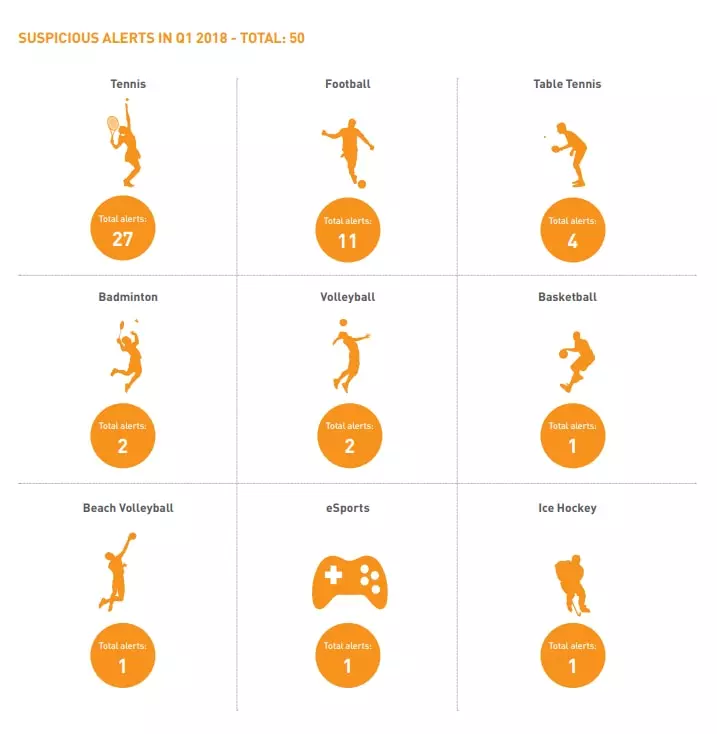 The organisation focused on keeping the integrity of sports betting, ESSA, revealed an increased number of suspicious betting alerts over the first quarter of 2018. According to report released by the global betting integrity body, a total of 50 cases of such betting alerts were made over the first three months of the year to the relevant authorities.
The organisation focused on keeping the integrity of sports betting, ESSA, revealed an increased number of suspicious betting alerts over the first quarter of 2018. According to report released by the global betting integrity body, a total of 50 cases of such betting alerts were made over the first three months of the year to the relevant authorities.
Nine sports were involved in the cases over 2018 Q1, including football, tennis and table tennis, volleyball and beach volleyball, basketball, badminton, ice hockey and eSports. As revealed by ESSA, most cases of suspicious betting alerts were in tennis, with 27 of them reported in the afore-mentioned period. Football was second, with 11 cases reported, followed by table tennis with a total of 4 suspicious betting alerts. Volleyball and badminton were present with 2 cases each, while one alert was made to competent authorities in beach volleyball, ice hockey, basketball and eSports, respectively.

Image credits: ESSA (Sports Betting Integrity)
As explained by ESSA in its 2018 Q1 integrity report, a betting pattern is considered unusual or suspicious when some continuous unexpected activity with abnormal bet sizes or volumes is detected. However, the sports betting integrity body needs to first make an investigation and detailed enquiry in order for such pattern to be confirmed as suspicious.
ESSA Report Follows Enhanced Corruption in Tennis Fears
 For the time being, ESSA still plays a key part in prevention of match-fixing and works in collaboration with special working groups at the Council of Europe, the European Commission (EC) and the International Olympic Committee (IOC).
For the time being, ESSA still plays a key part in prevention of match-fixing and works in collaboration with special working groups at the Council of Europe, the European Commission (EC) and the International Olympic Committee (IOC).
The information issued by ESSA about the increased number of suspicious betting alerts comes after recent reports of enhanced corruption in tennis, involving substantial match-fixing. According to the Independent Review of Integrity in Tennis and its author Adam Lewis QC, tennis is currently associated with more suspicious betting activity than any other sport. As revealed in the report, a total of 3,200 players at all levels of tennis took part in a survey, which found that 464 players representing 14.5% of the participants knew about match-fixing in the game.
As shared by Khalid Ali, the ESSA Secretary General explained, more than half of the suspicious betting activity alerts were related to tennis, but there were eight other sports which saw some reports on the matter.
As far as match-fixing in football is concerned, UEFA is responsible for protecting the integrity of European football through various integrity programmes and initiatives. Almost a decade ago, in 2009, UEFA started addressing the match-fixing issues in order to tackle foul practices in sports. The report released by ESSA in the first quarter of 2018, includes information about the measures taken by UEFA in order to keep integrity of football game intact, by using a four-pillar approach that involves legal framework, monitoring and investigations, education, and sanctions.
- Author


